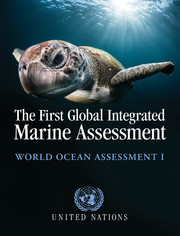Book contents
- Frontmatter
- Dedication
- Epigraph
- Contents
- Foreword and Preface
- Preface
- Summary of the first global integrated marine assessment
- The context of the assessment
- Assessment of Major Ecosystem Services from the Marine Environment (Other than Provisioning Services)
- Assessment of the Cross-cutting Issues: Food Security and Food Safety
- Assessment of Other Human Activities and the Marine Environment
- Assessment of Marine Biological Diversity and Habitats
- Section A Overview of Marine Biological Diversity
- Chapter 36 Overview of Marine Biological Diversity
- Section B Marine Ecosystems, Species and Habitats Scientifically Identified as Threatened, Declining or Otherwise in need of Special Attention or Protection
- I Marine Species
- II Marine Ecosystems and Habitats
- Section C Environmental, economic and/or social aspects of the conservation of marine species and habitats and capacity-building needs
- Overall Assessment
- Annexes
Preface
Published online by Cambridge University Press: 18 May 2017
- Frontmatter
- Dedication
- Epigraph
- Contents
- Foreword and Preface
- Preface
- Summary of the first global integrated marine assessment
- The context of the assessment
- Assessment of Major Ecosystem Services from the Marine Environment (Other than Provisioning Services)
- Assessment of the Cross-cutting Issues: Food Security and Food Safety
- Assessment of Other Human Activities and the Marine Environment
- Assessment of Marine Biological Diversity and Habitats
- Section A Overview of Marine Biological Diversity
- Chapter 36 Overview of Marine Biological Diversity
- Section B Marine Ecosystems, Species and Habitats Scientifically Identified as Threatened, Declining or Otherwise in need of Special Attention or Protection
- I Marine Species
- II Marine Ecosystems and Habitats
- Section C Environmental, economic and/or social aspects of the conservation of marine species and habitats and capacity-building needs
- Overall Assessment
- Annexes
Summary
As we seek to pursue sustainable development, we all need an understanding of the ways – environmental, social and economic – in which we humans interact with the world around us. Globally, the drive towards sustainable development cannot ignore the seven-tenths of the planet covered by the ocean. Such thoughts led to the recommendation of the 2002 Johannesburg World Summit on Sustainable Development, that there should be a regular process for the global reporting and assessment of the state of the marine environment, including socioeconomic aspects. We need to understand the overall benefits of the ocean to us humans, and the overall impacts of humans on the ocean.
In September 2015, the United Nations adopted the Sustainable Development Goals, including SDG 14 (“Conserve and sustainably use oceans, seas and marine resources for sustainable development”). It is therefore timely that the work put in hand by the Johannesburg Summit has now produced The First Global Integrated Marine Assessment – World Ocean Assessment I under the auspices of the United Nations General Assembly. The General Assembly considered and endorsed not only its Outline, but also the terms of reference and working methods of the Group of Experts and the guidance to contributors. The approach to the assessment has therefore been carefully considered at the global level.
Implementing the approach has been a major task, relying essentially on voluntary efforts from hundreds of experts in many fields. We and our colleagues in the Group of Experts of the Regular Process have been privileged to organize, contribute to, and produce the final version of, this Assessment. Crucial support has been provided by the secretariat of the Regular Process in the United Nations Secretariat, the Division for Ocean Affairs and the Law of the Sea of the Office of Legal Affairs, by several international organizations and by a number of United Nations Member States, as detailed in Chapter 2 (Mandate, information sources and method of work). The full draft assessment was reviewed by United Nations Member States. Under the terms of reference and working methods, the Group of Experts is collectively responsible for the final text.
The Regular Process was tasked with providing a first Assessment that could serve as a baseline for future cycles of the process.
- Type
- Chapter
- Information
- The First Global Integrated Marine AssessmentWorld Ocean Assessment I, pp. 9 - 10Publisher: Cambridge University PressPrint publication year: 2017

